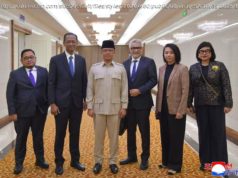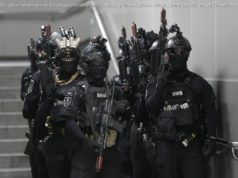 As a young child in the capital of North Korea, Sungju Lee lived a pampered life. But by the time he was a teenager, he was starving and fighting for survival in a street gang. It was one of many twists of fate on a journey that has led him to postgraduate studies at a British university.
As a young child in the capital of North Korea, Sungju Lee lived a pampered life. But by the time he was a teenager, he was starving and fighting for survival in a street gang. It was one of many twists of fate on a journey that has led him to postgraduate studies at a British university.
In the early 1990s, Sungju Lee was living comfortably with his parents in a three-bedroom apartment in Pyongyang. He attended school and Taekwondo classes, visited parks and rode on Ferris wheels. He assumed that, like his father, he would grow up to become an officer in the North Korean army.
But in 1994, this life came to an abrupt end with the death of North Korea’s founding father, Kim Il-Sung.
Although Sungju did not know it at the time, his own father, who had been working as a bodyguard, had fallen out of favour with the new regime. The family was forced to flee the capital. To hide from their child the danger they were in, his parents told him they were taking a holiday.
Sungju wanted to believe his father, but when he boarded a dirty, damaged train he had doubts.
„I saw beggars – kids my age – and I was shocked,“ he says.
„I asked my father, ‚Are we in North Korea?‘ Because when I was in Pyongyang, I was taught that North Korea was one of the richest countries in the world. “
Their destination was the north-western town of Gyeong-seong, where they moved into a tiny, unheated house. At school Sungju found the other students malnourished and behind in their classes.
One morning his teachers marched the children to an outside arena where they were told to sit and watch. Three police officers with guns appeared and a man and woman were led out and tied to wooden poles. The crowd was told the man had been caught stealing and the woman had tried to escape into China. They had both been convicted of high treason, and this was a public execution.
„Each of the police officers shot three bullets for each person. Bang, bang, bang,“ Sungju says.
„Blood came out. There was a hole in their forehead, and at the back of their head there was nothing left. “
As the months passed, Sungju struggled to adapt to his new harsh circumstances. Food was becoming more scarce as North Korea descended into a crippling famine and many of his classmates had dropped out of school to forage for squirrels or to steal from the local market.
Then suddenly Sungju’s father announced he was leaving. He told his son he was going to China to look for food, and would come back in a week with rice cakes.
The week passed, but Sungju’s father did not return.
Soon afterwards, his mother told him she was going to travel to his aunt’s house to find food. Fearing she would also not return, Sungju refused to leave her side. But eventually he fell asleep and she slipped away, leaving a note telling him to eat salt with water if he was hungry. He never saw her again.
„I started hating my parents,“ he says.
„They were so irresponsible. They just left me and I completely lost everything. “
At that point Sungju realised the only way he would survive was to form a street gang. He banded together with six other boys and they studied how to pick pockets and distract merchants so they could grab produce from their market stalls.
„We trusted each other. We could die for each other and we were all bound to each other and that’s how we survived,“ he says.
Every few months, when the merchants began to recognise them, the gang had to move to another town. Finding new territory also meant fighting the gang that was already working there.
„I was picked as a leader by my brothers because I knew how to do Taekwando,“ says Sungju.
„They thought I was really good at fighting, but it was different from street fighting. I lost many times, but my brothers believed in me. Their trust made me stronger,“ he says.
Although, as time went on, Sungju began to win his fights the boys in his gang were still only young teenagers. When they came up against older teens armed with weapons, the fights became more dangerous.
In one such encounter, one of his gang members was hit on the head and died. Then Sungju’s closest friend was killed by a farm guard for trying to steal a potato.
Sungju was devastated. After more than three years fighting on the streets, the gang began to drift apart and Sungju turned to opium for solace. With few options left open to them, the boys decided to return to Gyeong-seong.
It was there that Sungju was approached by an elderly man, whom he recognised as his grandfather. After Sungju’s family had left Pyongyang, his grandparents had never given up searching for them and had eventually moved to a farm a few hours‘ walk from Gyeong-seong. Every Sunday the old man would travel into the town in the hope of finding his grandson.
Now rescued from the streets, Sungju spent a few happy months living on his grandparents‘ farm. Once a week he walked to the market, carrying with him a backpack of food to share with his gang members, who had now found jobs helping the merchants.
Then a stranger arrived with an important message.
„The messenger passed me a letter that said: ‚Son, I’m living in China. Come to China to visit me,'“ Sungju says.
The stranger was a broker – a person who helped North Koreans escape from the country. He had arrived to smuggle Sungju over the border.
„I had two emotions in my heart,“ says Sungju.
„The first one was anger, I just wanted to punch my father. And the second emotion was that I missed him so much. I told my grandparents that I wanted to go to China to see my father and to punch him and then to come back,“ he says.
With the broker’s help, Sungju crossed into China by foot and then, after he was given fake documents, he boarded a plane to South Korea. It was here that he was finally reunited with his father.
„My father hugged me and we cried together,“ he says.
„I had tons of questions, but I just said, ‚I’ve missed you dad.‘ He said, ‚Where is your mother?‘ and I cried again because I didn’t know. “
Despite years of searching, Sungju and his father still do not know where his mother is. In 2009, a broker told them about a woman living in China who was similar to her in appearance and background. It turned out not to be Sungju’s mother, but his father helped her leave China anyway.
Sungju has also lost touch with the other boys in his gang, despite paying brokers to find them. He suspects they have been drafted into the North Korean army.
For a while, Sungju struggled with his identity in South Korea. When he first arrived he felt isolated. His accent marked him out as someone from the North, and many South Koreans believe North Koreans are brainwashed, he says.






